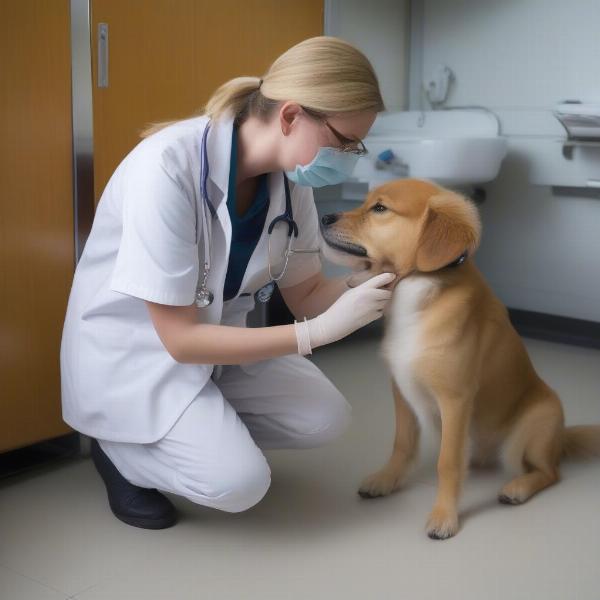Paracetamol poisoning in dogs is a serious issue and requires immediate veterinary attention. If your dog has eaten paracetamol, time is of the essence. Even a small dose can be toxic to dogs, causing severe liver damage and even death. This article will guide you on the immediate steps to take, the potential dangers of paracetamol for dogs, and how to prevent future incidents.
What are the Dangers of Paracetamol for Dogs?
Unlike humans, dogs cannot metabolize paracetamol effectively. This means that even a small amount can build up to toxic levels in their system. The primary danger is liver damage, which can lead to liver failure. Other potential complications include damage to red blood cells, reducing their ability to carry oxygen, and formation of methemoglobin, which interferes with oxygen transport in the blood. Symptoms of paracetamol poisoning in dogs can include vomiting, lethargy, loss of appetite, abdominal pain, jaundice (yellowing of the gums and whites of the eyes), difficulty breathing, and even seizures.
What to Do if Your Dog Eats Paracetamol
If you suspect your dog has ingested paracetamol, immediately contact your veterinarian or an emergency animal hospital. Do not wait for symptoms to appear. The sooner treatment is started, the better the chances of a full recovery. If possible, have the following information ready: the amount of paracetamol ingested, the time of ingestion, and any symptoms your dog is exhibiting. Your veterinarian may induce vomiting to remove the paracetamol from your dog’s stomach or administer activated charcoal to absorb the toxin. They might also perform blood tests to assess liver function and prescribe medications to support liver function and treat any complications.
 Veterinarian Examining a Dog
Veterinarian Examining a Dog
How to Prevent Paracetamol Poisoning in Dogs
Prevention is always better than cure. Keep all medications, including over-the-counter drugs like paracetamol, out of your dog’s reach. Store them in securely closed cabinets or drawers. Be mindful of visitors who might unknowingly leave medications within your dog’s access. Educate family members and guests about the dangers of paracetamol for dogs. Never give your dog human medication without consulting your veterinarian. Even medications that are safe for humans can be toxic to dogs. Regularly check your home for any dropped or misplaced pills.
Long-Term Effects of Paracetamol Poisoning in Dogs
While prompt treatment can often lead to a full recovery, some dogs may experience long-term liver damage. Regular monitoring of liver function may be necessary. In severe cases, liver failure can occur, which can be life-threatening.
What if I Can’t Afford Veterinary Care?
While veterinary care can be expensive, it is crucial for your dog’s survival in cases of paracetamol poisoning. Contact local animal shelters or rescue organizations. They might be able to offer financial assistance or direct you to low-cost veterinary services. Explain your situation to your veterinarian. They might be willing to work with you on a payment plan.
Conclusion
Paracetamol poisoning is a serious threat to dogs. Swift action is crucial if your dog has ingested paracetamol. Contact your veterinarian immediately. Prevention is key. Keep all medications out of your dog’s reach and educate yourself and others about the dangers of human medications for pets. By taking these precautions, you can help keep your furry friend safe and healthy.
FAQ
- Can I give my dog baby paracetamol? No, absolutely not. Even baby paracetamol is highly toxic to dogs.
- How much paracetamol is toxic to a dog? Even a small amount can be toxic. The toxic dose varies depending on the dog’s size and individual sensitivity.
- What are the signs of liver failure in dogs? Signs of liver failure can include jaundice, vomiting, lethargy, loss of appetite, and fluid accumulation in the abdomen.
- How long does it take for paracetamol to affect a dog? Symptoms can appear within a few hours of ingestion.
- Can dogs recover from paracetamol poisoning? With prompt and aggressive treatment, many dogs can recover fully.
- What is the antidote for paracetamol poisoning in dogs? N-acetylcysteine (NAC) is often used as an antidote.
- Are there any safe pain relievers for dogs? Never give your dog human medication without consulting your vet. Your veterinarian can recommend safe pain relievers for dogs.
ILM Dog is your trusted source for comprehensive dog care information. We offer expert advice on everything from breed selection and health care to training and nutrition. Whether you’re a new dog owner or a seasoned pro, ILM Dog is here to help you provide the best possible care for your canine companion. For more information on dog health, check out our articles on paracetamol dogs dosage chart uk and aspirin dose for dogs chart. We also have resources available on paracetamol dogs dosage chart pdf and how much calpol for 10kg dog calculator. Contact us at [email protected] or +44 20-3965-8624. ILM Dog – dedicated to helping you navigate the world of dog ownership.